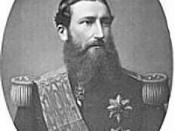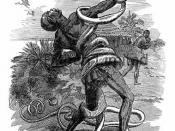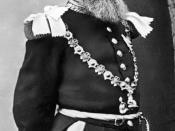The first successful exploration of the Congo was by journalist Henry Morton Stanley,
between 1874 and 1877. Upon his return to Europe, Stanley petitioned the British
government to colonize the region, but he was refused. However, King Leopold II of Belgium
hired Stanley to return to the Congo to set up trading stations and establish relations with
the native chiefs. In 1876 he hosted a meeting of world explorers, saying
he wanted to develop central Africa for European trade and help advance the people in
Africa, therefore creating the International Africa Association was created. The
"philanthropic" organization, controlled by Leopold himself, had a goal to acquire
territory in Africa. It had a stated purpose of promoting the exploration
and "civilization" of Central Africa in order to end the slave trade. Representing Leopold,
Stanley signed over 450 treaties allowing Leopold exclusive trading rights and also
control of the local land. The Africans were often given nothing in exchange and were
tricked into thinking that Stanley was sharing rights to the land.
Eventually Stanley
founded a number of posts, including Leopoldville and secured Leopold the rights to
extensive regions bordering the Congo River. The King's real motives, which he did not
express in public, were hardly unselfish. "I do not want to miss a good chance of getting
us a slice of this magnificent African cake"
Unlike colonies ruled by France and Britain, the Congo was ruled by Leopold
himself, directly from Belgium. In the Congo, the Belgian government officials powers
were limited to the goals of King Leopold. After he had established major posts and
bases, he simply placed European white men there to carry out his directives.
Low level Africans reported to middle level officials, which reported to a governor
general who acted on behalf of Kind Leopold. There was...


